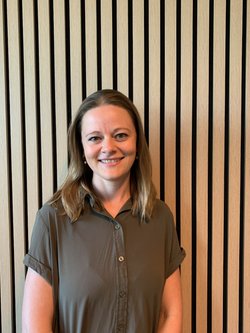
What is your workplace and job title?
I work in Aeven. We’re a newly established company (grown out of NNIT) working with adaptive digital infrastructure. We help companies in critical industries stay on course in a changing world by offering adaptable, specialized, and locally anchored digital infrastructure.
We’re a global company, and our 1,400 colleagues are located in Denmark, the Philippines, and the Czech Republic.
I’m the director of Communication, Branding & Sustainability.
What are two or three examples of daily tasks?
Every day is a new day. My role allows me to engage with colleagues across the organization on all our locations, and on all levels of the company. So my tasks vary a lot, which suits me perfectly.
A few examples:
How to communicate organizational changes to a global audience
Here, we need to take into account all the different cultures and expectations among our colleagues. The IT industry is very competitive, and our colleagues often get job offers from competitors. The way we communicate changes needs to be accurate and explaining exactly why we might change things. Corporate BS is a no-go. I advise leaders on how to best come across with their messages.
Writing articles about colleagues’ accomplishments
Feeling pride in your daily work is something that matters a lot to us. In my team, we make sure to communicate both small and big wins, trying to create enthusiasm and celebrate all the cool things that are being done to improve our Aeven.
Writing the communication strategy
At this point, we are six weeks old, and we need a new strategy for how to use communication as a leadership tool. This tool is not only for leaders, it’s for everyone. It is my ambition that all my colleagues learn how to use communication (language) as a tool to reach their goals – whether it is a happy team, a new customer, implementing changes, or something else.
What are the two or three main things you got from linguistics?
Understanding how language works, and how you use language and communication to change status quo. Communication is a leadership tool. As a leader, you need to possess a lot of skills, but if you can’t communicate, you’ll never make a difference.
Semantics. One word can make a huge difference. Knowing how different audiences perceive different words is crucial.
Conversation analysis. I believe that being able to understand the dynamics of conversations has helped me get to where I am today. When a leader utters a sentence, when the audience or conversation partner replies, I am able to identify ways of improving due to my analytic skills.